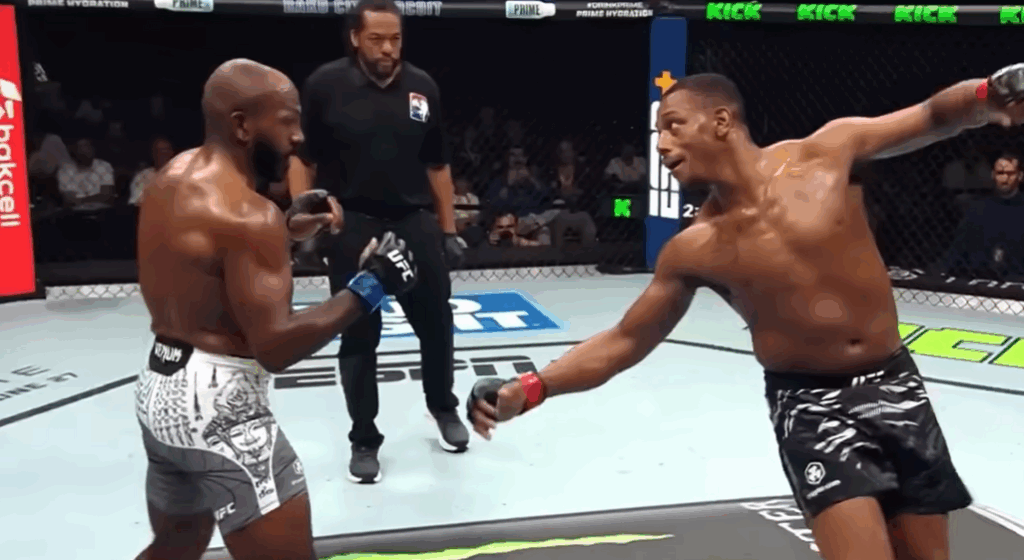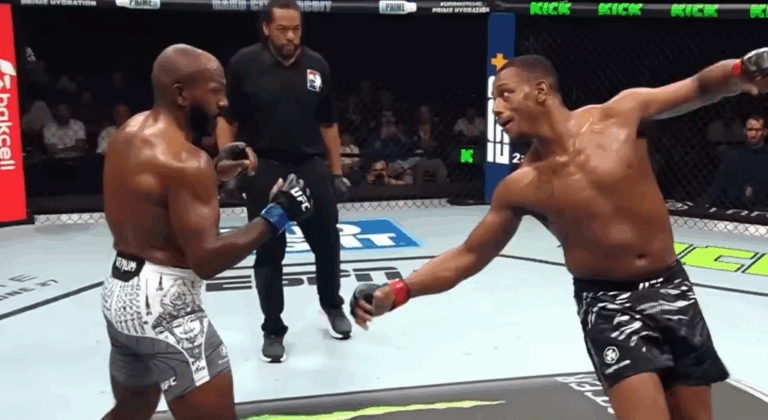Khalil Rountree – Bio and Professional Snapshot
| Full Name | Khalil Ibn Rountree Jr. |
|---|---|
| Date of Birth | February 6, 1990 |
| Birthplace | Los Angeles, California, USA |
| Height | 6 ft 1 in (1.85 m) |
| Weight Class | Light Heavyweight (205 lbs) |
| MMA Style | Muay Thai, Kickboxing |
| UFC Debut | July 8, 2016 |
| Record (as of 2025) | 13 Wins – 5 Losses – 0 Draws |
| Known For | Explosive knockouts, inspiring transformation |
| Former Weight | Over 300 lbs at age 20 |
| Current Weight | ~205 lbs (UFC Light Heavyweight limit) |
| Verified Reference | https://www.bbc.com/bbcthree/article/27ce5ded-e3d9-4b5c-ad32-a28bddaf692b |
There was a time when Khalil Rountree lived like a ghost. He had no sense of direction, weighed more than 300 pounds, and smoked two packs of cigarettes a day while chain smoking at the age of twenty. He was just existing; he wasn’t training, competing, or dreaming. He was selling merchandise for touring bands at the time, helping others achieve their dreams while his own faded further into the background. That marked the start of a phase that would ultimately completely change, characterized by both emotional and physical weight loss.
He had no experience playing competitive sports as a child. Rountree’s past was characterized more by grief than grit, whereas many fighters enter MMA after participating in boxing or wrestling as children. When Khalil was only two years old, his father, Khalil Sr., was tragically killed during a robbery. Unspoken and unresolved, that traumatic event lingered for years. He bore a generational burden in addition to a physical one.
He happened to receive an invitation from his brother to an MMA gym. There was no ambitious plan to compete in the UFC. All he wanted was to lose a few pounds. However, what began as informal training sessions eventually turned into a lifeline. Specifically, Muay Thai touched a nerve. The discipline felt therapeutic because of its structure, fluidity of motion, and ritualistic rhythm. His training was so effective that it started to awaken something that had lain dormant. He began reshaping his identity along with his body.
Rountree’s physical metamorphosis was breathtaking. His followers were genuinely astounded by how much lighter he became emotionally, even though his weight dropped from over 300 pounds to less than 210. He started recording the highs and lows on social media. Pictures of a chubby, defeated young person next to a toned, determined athlete went viral. These were unvarnished, occasionally painfully honest moments of progress rather than meticulously manicured “before and after” clichés.
Rountree established a rigorous and long-lasting routine by forming strategic alliances with mentors and coaches. Discipline, not perfection, was his top priority. He reprogrammed his system by combining rigorous diet regimens, full-body conditioning, and concentrated Muay Thai training. For novices who are overloaded with transformation tales, Rountree’s journey seems especially helpful. It is meticulous and profoundly human; it is neither ostentatious nor over the top.
Only a few years after he entered that first gym, he made his UFC debut in 2016. Although that timeline may seem incredibly short, it accurately captures the depth of his dedication. Rountree learned under pressure, in contrast to many fighters who have years of amateur experience. Although his early UFC bouts were difficult, his perseverance eventually became apparent. His Performance of the Night bonus at UFC 226 was a high point, as he stunned seasoned kickboxer Gokhan Saki with a strong and accurate TKO.
With lightning-fast combinations and granite composure, the man who used to have trouble breathing after a quick jog now astounds seasoned fighters. His footwork carried the ease of someone who had finally found their place, and his mental clarity had significantly improved.
Rountree’s temperament, however, is arguably the most unexpected aspect of his character. He doesn’t brag or bark, which makes him incredibly transparent in interviews. He speaks softly. He uses measured language. Furthermore, his tale is very different from the bluster that is frequently connected to the fight game. He frequently talks about striking a balance and embracing both his violent and sensitive sides. The yin-yang principle—accepting one’s inner light and shadow without guilt or denial—is reflected in that balance.
He shares this duality with other well-known people who have undergone significant change. Similar to how Robert Downey Jr. overcame addiction to become one of Hollywood’s most renowned actors, Rountree’s transformation implies that failure can serve as a springboard. Notably, both individuals now freely discuss their experiences—not as a warning, but as a continuing obligation to others who may be following in their footsteps.
Rountree freely acknowledges in interviews that he still harbors aspects of his previous self, such as anxiety, depression, and self-doubt, but he has learned to control them. The switch flips when disrespect is directed at him and a fight is imminent. He is facing every bully who has ever attempted to denigrate him and every demon that has previously paralyzed him inside the cage, not for fame or money. It’s remarkably comparable to how artists utilize suffering as a catalyst for creativity. Rountree just uses battle to channel his.

His story also contributes to a larger social discourse on transformation, including complete life reinventions as well as physical changes. Athletes like Michael Phelps and Simone Biles have challenged conventional ideas of toughness in recent years by talking openly about mental health. Rountree contributes to that discussion not as an anomaly but as a living illustration of how professional success is fueled by personal well-being.
Comments like “You saved my life” or “I started training because of your story” are frequently posted on his Instagram by fans. Rountree has never hesitated to share his past, even though he doesn’t try to draw attention to it. In a sport where machismo and silence have frequently been the norm, his candor feels especially novel. His brand is strengthened rather than weakened by that vulnerability.
Rountree has developed more than just a career by incorporating emotional integrity and regular structure into his way of life. He has earned people’s trust. That authenticity is incredibly dependable and rare. Even when his knuckles are hurtling through the air at terrifying speeds, Rountree maintains his sense of groundedness, in contrast to many athletes who rely on stylists and spin.
His experience of being overweight, depressed, and lost has turned into a source of strength. He demonstrates that who you are now need not be defined by who you were when you were at your lowest. And his unvarnished, changing story is a welcome change in a culture overrun with filters, carefully manicured fitness regimens, and unattainable ideals.


